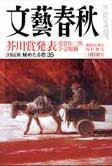
Advanced Reading Comprehension and Translation
2010年後半芥川賞受賞作品
Professor Ted Mack
Spring 2011: JAPAN 460
Mondays, Wednesdays, and Fridays 9:00-10:20pm
MGH 248


 |
Advanced Reading Comprehension and Translation 2010年後半芥川賞受賞作品 Professor Ted Mack Spring 2011: JAPAN 460 Mondays, Wednesdays, and Fridays 9:00-10:20pm |
 |
 |
We will read one of the most recent Akutagawa Prize-winning works, "Kueki ressha" by Nishimura Kenta; should time allow, we may also look at "Kiko-Towa" by Asabuki Mariko. The former appeared originally in the December 2010 issue of Shinchô and the latter in the September 2010 issue of the same magazine. Both works were then reprinted in the March 2011 issue of Bungei shunjû.
"Kueki ressha" is a gritty story about a young day laborer in Tokyo. Please note that the work contains content that is only appropriate for mature audiences. Although every effort will be made to make course discussion of such sections as unobjectionable as possible, please realize that discussion of the text will inevitable also touch on these matters.
The prerequisite for this course is a 2.5 or higher in JAPAN 313 (or its equivalent.)
You will need a good dictionary. One excellent choice, if you have access to the Internet, is Yahoo! Japan's free online dictionaries. You would also find a grammar reference, such as this one, very handy. If you prefer paper dictionaries, look for a good collegiate Japanese-English dictionary and a medium-sized Japanese-Japanese dictionary. If you do not have Internet access, consider investing in an electronic dictionary.
On occasion, elaboratons and clarifications of classroom discussions will be posted to my course blog, Reading Japanese.
Reading Schedule:
Students' reading speeds differ so dramatically that it is difficult to provide a detailed schedule in advance. Please come to the first day of class to receive the first reading and to find out how much to prepare for subsequent meetings.
Please note that I will traveling on the following dates: March 28, March 30, May 20, May 23, and May 25. I will try to arrange for substitutes to teach those days, but if that is not possible, those sessions will be cancelled.
About the Course:
This course focuses solely on developing advanced Japanese reading skills through practice. Students read through contemporary Japanese fiction on their own and then meet to go over that reading, focusing on grammar and vocabulary but also discussing literary devices and effects. Unlike most other language offerings, this course is made up of readings that have not been tailored or selected for ease of comprehension. Students read celebrated stories of recent years, regardless of difficulty, in their complete form. The goal of the course is to introduce students to the real complexity and beauty of written Japanese, while providing them with the tools necessary to read even the most challenging fiction. The hope is that the course will begin students on a lifelong path of reading Japanese literature – whether professionally or recreationally.
A grade of 2.5 or higher in JAPAN 313 or its equivalent is an absolute requirement. A high level of Japanese reading ability is required; expect the gulf between third-year Japanese readings and these stories to be substantial.
The syllabus below will be in flux throughout the semester as we move through the stories. Watch the online syllabus and talk with your classmates about where we are for any given class meeting.
Required Materials: "Kueki ressha" is available in PDF form. I am also provided "Kiko - Towa" for your reference.
Grading:
Participation and preparation (50%):
All class members will be expected to complete assigned readings before class meets. Class meetings will involve recitation in Japanese, translation, and discussion of grammar in either English or Japanese. Every student will be called on at every class meeting; likely each will be called multiple times. Inadequate preparation will result in a reduction of one's participation grade. Late arrivals disrupt class; therefore you are expected to arrive on time. Please turn off all cell phones before class begins.
Weekly short quizzes (30%; every Monday, unless otherwise noted):
Quizzes will be made up of translation questions involving sentences chosen from the previous week's reading.
Final comprehensive exam (20%):
The final exam will be made up of translation questions involving sentences chosen from among all the readings.
The copyright law of the United States (Title 17, United States Code) governs the making of photocopies or other reproductions of copyrighted materials. Under certain conditions specified in the law, libraries and archives are authorized to furnish a photocopy or other reproduction. One of these specified conditions is that the photocopy or reproduction is not to be "used for any purpose other than private study, scholarship, or research." If a user makes a request for, or later uses, a photocopy or reproduction for purposes in excess of "fair use," that user may be liable for copyright infringement.
Page last updated on March 21, 2011